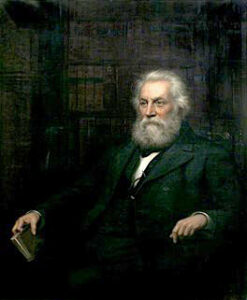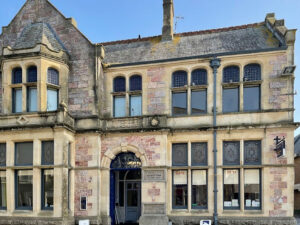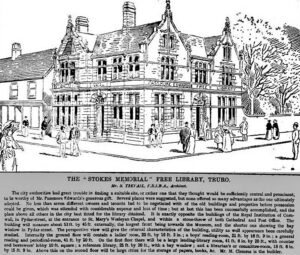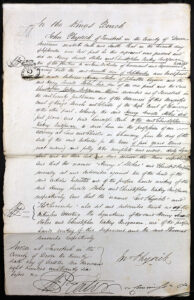 Henry Sewell Stokes
Henry Sewell Stokes
Portrait by Edward Arthur Fellowes Prynne (1854–1921).
Courtesy ArtUK – owned by Truro City Council and hangs in their Council Chambers.
Susan Coney, researcher and writer, devotes much of her time to all things Cornish. Here she turns her attention to a man who is arguably not as well-known as he should be. Henry Sewell Stokes was not Cornish by birth but he made it his home and contributed greatly to its well-being and history.
The Passmore Edwards Library in Pydar Street, Truro, is called the Stokes Memorial – the plaque stating this can still be seen above the door.


John Passmore Edwards, born Blackwater in 1823, decided to dedicate the building to Stokes as he had his first job as a clerk to Henry Sewell Stokes who was a solicitor in Truro. (Royal Cornwall Gazette 30th May 1895)
Henry Sewell Stokes was born in Gibraltar, the eldest son of Henry Stokes (died 1832), proctor and notary there, who married in 1807 at Gibraltar, Anne Sewell (1787–1857).
Henry Sewell Stokes came to England in 1815, and became a pupil at St. Saviour’s Grammar School, Southwark, and later, to the school of a young Baptist Minister called William Giles at Chatham, where Charles Dickens was his companion.
In 1825 he returned to Gibraltar and studied mercantile law in his father’s office and acquired a knowledge of French, Spanish, and Italian.
He was then articled to Mr. Bridgman, a solicitor at Tavistock, and was admitted attorney and solicitor in January and February 1832. For a short time, he was a student of the Middle Temple.
 Articles of Clerkship 1826 Henry Sewell Stokes
Articles of Clerkship 1826 Henry Sewell Stokes
Stokes lived for some weeks in St. Austell, getting up evidence on mining customs in the Duchy. In April 1832 he settled at Truro, where he practised as solicitor for many years, and played an active part as a Liberal in local politics.
In July 1833, Henry Sewell Stokes started the Cornish Guardian and Western Chronicle newspaper (which were later emerged with the West Briton), and for three years was its editor, with Charles Buller and Sir William Molesworth as occasional leader writers. Stokes also wrote leaders for the Devon Independent, published at Devonport, but with a large circulation in Cornwall, and was an occasional contributor to the West Briton.
He married at Tavistock, on 9th August 1834, Louisa Rachel, daughter of the Rev. William Evans of Parkwood in that town. They had a son, William Evans Stokes, and three daughters.
From the number of his poems on Cornwall, Stokes was sometimes referred to as “The Laureate for Cornwall.” Tennyson spent a week with him at Truro in 1848.
He lived in Princes Street, Truro, then Strangways Terrace until he retired and moved to Bodmin.
Stokes was elected Mayor of Truro for 1855 – 1856 and in 1859 was appointed Town Clerk. On the nomination of Lord Vivian, Lord Lieutenant of the County, in February 1865, he became Clerk of the Peace for Cornwall, continuing in that position until his death. The duties of this post forced him to move to Bodmin, where he spent the rest of his days.
His wife died at Bodmin on 15th February 1890, aged 80, and he died there on 7th April 1895 and was buried in its cemetery on 13th April.
His chief works, many of which attest his love of Cornwall, were:
‘The Lay of the Desert,’ 1830, designed and in part written on Dartmoor; the substance of it was revised and included in the sixth and seventh cantos of ‘Memories,’ 1872.
‘The Song of Albion: a Poem on the Reform Crisis,’ 1831.
‘Discourses on Opinion,’ 1831.
‘The Vale of Lanherne,’ 1836; new edit. with costly illustrations by Charles Haghe, from designs by James G. Philp, 1853.
‘Echoes of War,’ 1855.
‘Scattered Leaves,’ 1862.
‘Rhymes from Cornwall,’ 1871; reissued in 1884 as ‘Voyage of Arundel and other Rhymes from Cornwall.’
‘Memories’ [anon.], 1872; new edit. [anon.] 1879.
‘Poems of later years,’ 1873; reissued in 1881 as ‘The Chantry Owl and other Verses.’
‘Restormel: a Legend of Piers Gaveston,’ 1875; republished 1882. 11.
‘The Gate of Heaven: the Plaint of Morwenstow,’ 1876.
Stokes published numerous flysheets and small poems. He contributed to the ‘Mining Almanac’ of Henry English (1849, pp. 105–116) an article on the court of the vice-warden of the stannaries, and read before the meeting of the British Archæological Association at Bodmin on 17th August 1876, a paper on books and manuscripts relating to the county, which was printed in its journal (xxxiii. 35–45).[2]
References:
https://pennyspoetry.fandom.com/wiki/Henry_Sewell_Stokes
 Susan Alecia Coney (née Phillips)
Susan Alecia Coney (née Phillips)
Although I was never very interested in history at school, it is now a big part of my life. I enjoy both the research and writing about it. Initially, it was about my family and their involvement in the community but this sparked a more general interest in Cornish history, of its people and places. I have been involved in a number of projects relating to Truro and have enjoyed this opportunity to record the results for future generations.

Thanks for adding this story. I read a rare book at the British Library last week – ‘Poems of Cornwall’ from 1892. It features three Stokes’ poems, The Response of Earth to Heaven; Life; and The Casts. They hold pride of place as the first poems in the book. I did not know Stokes’ back story, so I’m grateful to you.
Glad you found the article interesting and informative.
best wishes Susan
Thank you for this interesting piece of research, particularly in its biographical details. I have come across Stokes as a Cornish poet in my thesis on Hosken. Stokes’s 1853 introduction to his very long (and not very readable) Vale of Lanherne seems representative of his social circle and their general lack of awareness of living conditions of those outside it, perhaps surprising in such a well-travelled man. His assertions that ”the poor are not neglected” and that “the grotesque yet fearful grouping of luxury, poverty and crime must either have escaped my short sight or cannot be found in these parts” is confounded by the lives and writings of John Harris, Hosken and others of the time from underprivileged backgrounds. His belief that “few are so sanguine as to expect that political changes and social arrangements will very materially affect the old distinctions of rich and poor” would also be seriously challenged.
Mr Stokes was also appointed the first Clerk to Cornwall County Council when it came into existence in 1889, a role combined with the post of Clerk of the Peace; an arrangement that lasted until the abolition of the courts of Quarter Sessions in the 1970s. He held these roles until his death.
Dear Susan
Wonderfully written
Deepest heartfelt gratitude for your presentation here
This article has offered valuable insights into the life of my Great Great Great Great Grandfather
With much love and respect for your research and dedication
Dear Jennifer,
I am pleased you found my article so interesting. You must be very proud of your 4*great grandfather – he was a remarkable man.
best wishes
Susan